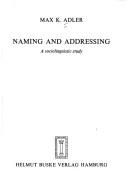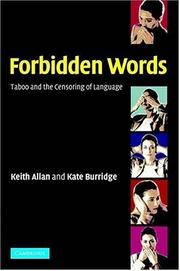| Listing 1 - 9 of 9 |
Sort by
|
Book
ISBN: 9780198808190 9780192535702 Year: 2019 Publisher: Oxford : Oxford university press,
Abstract | Keywords | Export | Availability | Bookmark
 Loading...
Loading...Choose an application
- Reference Manager
- EndNote
- RefWorks (Direct export to RefWorks)
This volume brings together experts from a wide range of disciplines to define and describe tabooed words and language and to investigate the reasons and beliefs behind them. In general, taboo is defined as a proscription of behaviour for a specific community, time, and context. In terms of language, taboo applies to instances of language behaviour: the use of certain words in certain contexts. The existence of linguistic taboos and their management lead to the censoring of behaviour and, as a consequence, to language change and development.0Chapters in this volume explore the multiple types of tabooed language from a variety of perspectives, such as sociolinguistics, anthropology, philosophy, psychology, historical linguistics, and neurolinguistics, and with reference to fields such as law, publishing, politics, and advertising. Topics covered include impoliteness, swearing, censorship, taboo in deaf communities, translation of tabooed words, and the use of taboo in banter and comedy.
Taboo, Linguistic. --- Taboo, Linguistic --- Linguistic taboo --- Ineffable, The --- Taboo
Book

ISBN: 9783110582758 9783110580518 9783110685152 3110580519 3110582759 3110580314 Year: 2018 Volume: 61 Publisher: Berlin Boston
Abstract | Keywords | Export | Availability | Bookmark
 Loading...
Loading...Choose an application
- Reference Manager
- EndNote
- RefWorks (Direct export to RefWorks)
Linguistic taboo has been relegated for a long time to a peripheral position within Linguistics, due to its social stigmatization and inherent linguistic complexity. Recently, though, there has been a renewed interest in revisiting the phenomenon, especially from cognitive frameworks. This volume is the first collection of papers dealing with linguistic taboo from that perspective. The volume gathers 15 chapters, which provide novel insights into a broad range of taboo phenomena (euphemism, dysphemism, swearing, political correctness, coprolalia, etc.) from the fields of sexuality, diseases, death, war, ageing or religion. With a special focus on lexical semantics, the authors in the volume work within Cognitive Linguistics frameworks such as conceptual metaphor and metonymy, cultural conceptualization or cognitive sociolinguistics, but also at the interface of pragmatics, discourse analysis, applied linguistics, cognitive science or psychiatry. This volume provides theoretical reflections and case studies based on new methods and data from varied languages (English, Spanish, Polish, Dutch, Persian, Gikũyũ and Egyptian Arabic). As such, it moves towards a new generation of linguistic taboo studies.
Taboo, Linguistic. --- Linguistic taboo --- Ineffable, The --- Taboo --- Cognitive Linguistics. --- Language and Culture. --- Language and Society. --- Linguistic Taboo.
Book
ISBN: 9781443878722 1443878723 9781443874502 1443874507 Year: 2015 Publisher: Newcastle upon Tyne, England : Cambridge Scholars Publishing,
Abstract | Keywords | Export | Availability | Bookmark
 Loading...
Loading...Choose an application
- Reference Manager
- EndNote
- RefWorks (Direct export to RefWorks)
The word ain't is used by speakers of all dialects and sociolects of English. Nonetheless, language critics view ain't as marking speakers as ""lazy"" or ""stupid""; and the educated assume ain't is on its deathbed, used only in clichés. Everyone has an opinion about ain't. Even the grammar-checker in Microsoft Word flags every ain't with a red underscore. But why? Over the past 100 years, only a few articles and sections of books have reviewed the history of ain't or discussed it in dialect cont...
Taboo, Linguistic. --- English language --- Linguistic taboo --- Ineffable, The --- Taboo --- Semantics. --- Semasiology --- English language Semantics --- Semantics
Book
ISBN: 9781350169678 9781350169685 9781350169692 1350169692 1350169676 1350169684 1350169706 Year: 2020 Publisher: London Bloomsbury Academic
Abstract | Keywords | Export | Availability | Bookmark
 Loading...
Loading...Choose an application
- Reference Manager
- EndNote
- RefWorks (Direct export to RefWorks)
Why do people take offence at things that are said? What is it exactly about the offending utterance which causes this negative reaction? How well motivated are these responses? Offensive Language addresses these questions by applying an array of concepts from linguistic pragmatics and sociolinguistics to a wide range of examples, from TV to Twitter and from Mel Gibson to Donald Trump. Establishing a sharp distinction between potential offence and actual offence, Jim O'Driscoll then examines a series of case studies where offence has been caused, assessing the nature and degree of both the offence and the documented response to it in. Through close linguistic analysis, this book explores the fine line between free speech and criminal activity, searching for a principle way to distinguish the merely embarrassing from the reprehensible and the censurable. In this way, a new approach to offensive language emerges, involving both how we study it and also how it might be handled in public life.
Sociolinguistics --- Taboo, Linguistic --- Politeness (Linguistics) --- Obscene words --- Linguistics --- English language Obscene words --- English language --- Linguistic taboo --- Ineffable, The --- Taboo --- Slang
Book
ISBN: 348430913X 3111928403 3111347338 9783111347332 9783484309135 Year: 1986 Volume: 13 Publisher: Tübingen Niemeyer
Abstract | Keywords | Export | Availability | Bookmark
 Loading...
Loading...Choose an application
- Reference Manager
- EndNote
- RefWorks (Direct export to RefWorks)
Lexicology. Semantics --- French language --- Taboo, Linguistic --- Lexicography --- -Taboo, Linguistic --- Linguistic taboo --- Ineffable, The --- Taboo --- Langue d'oïl --- Romance languages --- Taboo, Linguistic. --- Lexicography. --- French language - Lexicography --- Lexicographie --- LEXICOLOGIE FRANCAISE --- LEXICOGRAPHIE
Book
ISBN: 9021517256 Year: 1992 Publisher: Utrecht Kosmos
Abstract | Keywords | Export | Availability | Bookmark
 Loading...
Loading...Choose an application
- Reference Manager
- EndNote
- RefWorks (Direct export to RefWorks)
803.93-086 --- Dutch language --- -Taboo, Linguistic --- sociolinguïstiek --- #A9209A --- #KVHA:Taalgebruik Taboes --- #KVHA:Sociolinguistiek Nederlands --- 803.93-086 Nederlands: slang jeugdtaal vaktaal --- Nederlands: slang jeugdtaal vaktaal --- Linguistic taboo --- Flemish language --- Netherlandic language --- Social aspects --- 8 --- eufemismen --- eufemismen. --- Taboo, Linguistic --- #KVHA:Sociolinguistiek; Nederlands --- #KVHA:Taalgebruik; Taboes --- 803.93-086 Nederlands: slang; jeugdtaal; vaktaal --- Nederlands: slang; jeugdtaal; vaktaal --- Ineffable, The --- Taboo --- Germanic languages --- Sociolinguistics --- Nederlandse taal --- Tabou (linguistique)

ISBN: 3871183326 9783871183324 Year: 1978 Publisher: Hamburg Buske
Abstract | Keywords | Export | Availability | Bookmark
 Loading...
Loading...Choose an application
- Reference Manager
- EndNote
- RefWorks (Direct export to RefWorks)
Sociolinguistics --- 316:800 --- Names, Personal --- Forms of address --- Magic --- Taboo, Linguistic --- Euphemism --- Figures of speech --- Semantics --- Linguistic taboo --- Ineffable, The --- Taboo --- Magick --- Necromancy --- Sorcery --- Spells --- Occultism --- Address, Forms of --- Address, Titles of --- Titles of address --- Letter writing --- Salutations --- Titles of honor and nobility --- Anthroponomy --- Baby names --- Christian names --- Family names --- Forenames --- Names of families --- Names of persons --- Personal names --- Surnames --- Names --- Onomastics --- Language and languages --- Language and society --- Society and language --- Sociology of language --- Language and culture --- Linguistics --- Sociology --- Integrational linguistics (Oxford school) --- Sociolinguistiek --- Social aspects --- Sociological aspects --- Sociolinguistics. --- Names, Personal. --- Forms of address. --- Magic. --- Taboo, Linguistic. --- Euphemism. --- 316:800 Sociolinguistiek
Book
ISBN: 9789027254238 9027254230 9789027290496 9027290490 1282105620 9781282105621 9786612105623 6612105623 Year: 2008 Publisher: Amsterdam Benjamins
Abstract | Keywords | Export | Availability | Bookmark
 Loading...
Loading...Choose an application
- Reference Manager
- EndNote
- RefWorks (Direct export to RefWorks)
Sociolinguistics --- Advertising. Public relations --- Pragmatics --- Advertising --- Taboo, Linguistic. --- Reclame --- Reclame en taboe --- Reclameteksten --- Taalgebruik in de reclame --- Taboe --- Moral and ethical aspects. --- Social aspects. --- sociale aspecten --- linguïstiek --- #KVHA:Meertalige communicatie --- #KVHA:Reclame --- 659.1 --- Publicity. Advertising --- LANGUAGE ARTS & DISCIPLINES --- Linguistics / General --- Taboo, Linguistic --- Commerce --- Business & Economics --- Social aspects --- Moral and ethical aspects --- 659.1 Publicity. Advertising --- Reclame en taboe. --- Reclameteksten. --- Taalgebruik in de reclame. --- sociale aspecten. --- linguïstiek. --- Linguistic taboo --- Ineffable, The --- Taboo --- Society and advertising --- Ads --- Advertisements --- Advertising, Consumer --- Advertising, Retail --- Advertising, Store --- Commercial speech --- Consumer advertising --- Retail advertising --- Speech, Commercial --- Store advertising --- Business --- Communication in marketing --- Industrial publicity --- Retail trade --- Advertisers --- Branding (Marketing) --- Propaganda --- Public relations --- Publicity --- Sales promotion --- Selling

ISBN: 9780521819602 9780521525640 0521819601 0521525640 9780511617881 9780511335143 0511335148 9780511331923 0511331924 0511333900 9780511333903 0511334567 9780511334566 0511617887 1107159431 9781107159433 1281040215 9781281040213 9786611040215 6611040218 0511333226 9780511333224 051156192X Year: 2006 Publisher: Cambridge Cambridge University Press
Abstract | Keywords | Export | Availability | Bookmark
 Loading...
Loading...Choose an application
- Reference Manager
- EndNote
- RefWorks (Direct export to RefWorks)
Many words and expressions are viewed as 'taboo', such as those used to describe sex, our bodies and their functions, and those used to insult other people. This 2006 book provides a fascinating insight into taboo language and its role in everyday life. It looks at the ways we use language to be polite or impolite, politically correct or offensive, depending on whether we are 'sweet-talking', 'straight-talking' or being deliberately rude. Using a range of colourful examples, it shows how we use language playfully and figuratively in order to swear, to insult, and also to be politically correct, and what our motivations are for doing so. It goes on to examine the differences between institutionalized censorship and the ways individuals censor their own language. Lively and revealing, Forbidden Words will fascinate anyone who is interested in how and why we use and avoid taboos in daily conversation.
Taboo, Linguistic --- Politeness (Linguistics) --- Jargon (Terminology) --- Swearing --- Euphemism --- 800.862 --- Slang. Vulgair taalgebruik --- Euphemism. --- Swearing. --- Taboo, Linguistic. --- Politieke correctheid (linguïstiek) --- Taal en censuur --- Taboe --- Vloeken (linguïstiek) --- eufemismen --- Politieke correctheid (linguïstiek). --- Taal en censuur. --- Vloeken (linguïstiek). --- eufemismen. --- slang. --- linguïstiek. --- Jargon (Terminology). --- Politeness (Linguistics). --- Censorship --- Political correctness --- Linguistic taboo --- Ineffable, The --- Taboo --- Profanity --- Cant --- Correctness, Political --- PC (Political correctness) --- P.C. (Political correctness) --- Ideology --- Courtesy (Linguistics) --- Linguistics --- Buzzwords --- Gobbledygook --- Slang --- Terms and phrases --- Figures of speech --- Semantics --- Book censorship --- Books --- Literature --- Literature and morals --- Anticensorship activists --- Challenged books --- Expurgated books --- Intellectual freedom --- Prohibited books --- Law and legislation --- Lexicology. Semantics --- Sociolinguistics --- Pragmatics --- Censorship. --- Political correctness. --- Etiquette. --- Taal en talen --- Arts and Humanities --- Language & Linguistics --- Eufemismen. --- Slang. --- Linguïstiek.
| Listing 1 - 9 of 9 |
Sort by
|

 Search
Search Feedback
Feedback About UniCat
About UniCat  Help
Help News
News